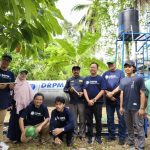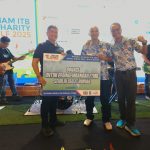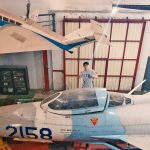FTMD Explores Potential Collaboration with BRIN Satellite Technology Research Center
Bandung – The Faculty of Mechanical and Aerospace Engineering (FTMD) conducted a visit to the Satellite Technology Research Center, National Research and Innovation Agency (Pusat Riset Teknologi Satelit BRIN) on Monday, March 26, 2023. The purpose of this visit was to explore the potential for educational collaboration and research partnerships. The collaborative exploration with FTMD is a strategic initiative undertaken by BRIN to promote the growth of industries related to enhancing the quality of human resources (HR) within companies.
On that day’s visit, the FTMD delegation, consisting of Prof. Dr. Ir. Hari Muhammad, Rianto Adhy Sasongko, S.T., M.Sc., Ph.D., Yohanes Bimo Dwianto, S.T., M.T., Ph.D., Ir. Muhammad Kusni, MT., Dr.Ir. Leonardo Gunawan, Ony Arifianto, Ph.D., Dr. Eng. Ridanto Eko Poetro, S.T., M.Sc., and Dr. Riza Wirawan, M.T., attended a discussion agenda and conducted a workplace visit to the Satellite Technology Research Center, National Research and Innovation Agency (BRIN).
The meeting, attended by FTMD delegates and representatives from several BRIN research centers, including the Aviation Technology Research Center, Satellite Technology Research Center, and Rocket Technology Research Center, had a primary focus on exploring the possibility of collaboration in the fields of education and research. The discussion commenced with introductions of the two institutions, followed by a deliberation on the forms of educational collaboration between BRIN and FTMD.
The potential for collaboration in the field of education with FTMD is currently being explored by BRIN. In its recent policy, BRIN has set a requirement for each of its employees to hold a doctoral degree. This policy has generated the need for BRIN to enroll its staff in higher education programs, ranging from bachelor’s to master’s degrees and from master’s to doctoral degrees. The Doctor by Research program offered by FTMD emerges as a potential solution to meet BRIN’s educational requirements. The curriculum and research activities in this program will be tailored to align with BRIN’s needs, allowing BRIN employees to pursue or initiate new research at BRIN while pursuing advanced education at FTMD. The research outcomes produced are expected to contribute significantly to BRIN’s future advancements. Additionally, other potential collaborations discussed include the Master by Research program for BRIN employees, considering that such a program has not been implemented at FTMD.
In addition to discussions regarding the educational collaboration framework, this meeting also explored the potential for research collaboration between FTMD and the BRIN research centers in attendance. The focus of this discussion was to identify common research interests and explore possibilities for collaboration in advancing ongoing research initiatives. Delegates from FTMD and the BRIN research centers exchanged information about ongoing research projects in their respective institutions, encompassing areas such as aviation technology, satellite technology, and rocket technology. This discussion involved the exchange of ideas and experiences, as well as the potential for collaboration to optimize research outcomes and broaden understanding in these fields. Through the research collaboration between FTMD and the BRIN Research Centers, it is anticipated that a strong synergy will be created, enhancing research capacity and contributing to the progress of science and technology in Indonesia.
The FTMD delegation also visited the workplace environment of the Satellite Technology Research Center, BRIN, including the satellite manufacturing laboratory. Delegates had the opportunity to observe firsthand the satellite manufacturing process, from its developmental stages to the flight-ready phase. They gained insights into the necessary steps involved in producing a satellite ready for launch.
In addition, the delegation was also invited to observe the satellite shipping facilities, paying attention to various requirements related to the structural materials used. While visiting other laboratories, FTMD delegates received information about the history of BRIN, the various types of satellites developed, and their respective purposes. They also had the opportunity to view models of satellites in production and satellite control centers that have been successfully launched for data collection.
This visit provided a valuable opportunity for the FTMD delegation to witness firsthand the activities and facilities at the Satellite Technology Research Center, BRIN. This experience not only expanded their knowledge of satellite technology but also opened up the potential for deeper collaboration between FTMD and the research center in the field of satellite development and research.
Credit: Vanela Kusuma Amalia







